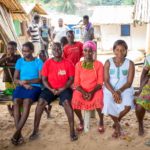At a glance
A husband from the Atsrulume community in the Volta region, inspired by the transformative Gender Model Family (GMF) approach, made a groundbreaking decision to escort his wife to the Keyime Health Centre to deliver their third child in September 2024. This marked the first time he took such an active role in the childbirth process, a decision deeply influenced by his training through the GMF.
The intervention/ Approach
The GMF approach, founded by Send Ghana and utilized under the Co-Impact funded initiative ‘Putting Women and Girls at the Centre of Primary Health Care (PHC) in Ghana’, aims to foster improved health outcomes by promoting equality and equity in health-related behaviors. It specifically targets selected families in the implementing areas and trains them to model positive health-seeking behaviors that prioritize the well-being of women and girls. Through this approach, families are encouraged to engage in practices that promote gender equality, focusing on sharing responsibilities at home and ensuring that women receive the care and support needed.
By creating a safe space where men and women can actively participate in health decision-making, the GMF approach challenges traditional gender roles that often place the burden of caregiving and other domestic chores solely on women. Through training and awareness creation, men are encouraged to actively support their wives at home to improve their health-seeking behaviours and outcomes. This shift in mindset is crucial in ensuring that women have the physical, emotional, and psychological support needed to thrive in life.
Mr. Weto and his wife trained through the GMF approach in the Atsrulume community, shared their journey with the project team. Mr. Weto expressed how the principles of gender equality instilled through the training encouraged him to take an active role in his wife’s pregnancy and delivery; a responsibility that is often culturally viewed as solely the woman’s domain. Mr. Weto admitted that the experience was challenging but deeply fulfilling. Accompanying his wife to the health center was a decision that reflected his commitment to the well-being of his wife and their child, as well as a recognition of the importance of shared responsibility in parenting.
The Impact
His story is a testament to the success of the GMF approach in transforming attitudes toward gender roles and health-seeking behaviors. ARHR, through Global Action for Women Empowerment (GLOWA), an implementing partner in the Volta Region, has provided the tools for families to improve health outcomes and fostered a deeper sense of partnership between spouses, demonstrating that men’s involvement in healthcare can play a crucial role in ensuring the safety and well-being of women and children in rural communities. Mr. Weto’s action is a powerful example of how the initiative can reshape the landscape of healthcare and gender equality in Ghana.
Furthermore, his experience highlights the ripple effect the initiative can have within the community. Mr. Weto’s decision to accompany his wife changed his approach to family health and this serves as a model for other men in Atsrulume and neighboring communities. The positive impact of this shift is evident in the increased awareness and participation of men in family health decisions, which will lead to better health outcomes for women and children in the region.
The success of the GMF approach will be a game changer in addressing the cultural barriers that have traditionally hindered men from being actively involved in household chores and caregiving. As more men embrace the values of shared responsibility, there is growing hope that the Volta region, and other areas in Ghana, will see improved health outcomes for women and children. Mr. Weto and his wife’s story is a powerful reminder that lasting change is possible when communities unanimously challenge entrenched norms and work towards a more equitable future.
Credit:
Our Implementing Partner in Volta Region:
GLOWA



